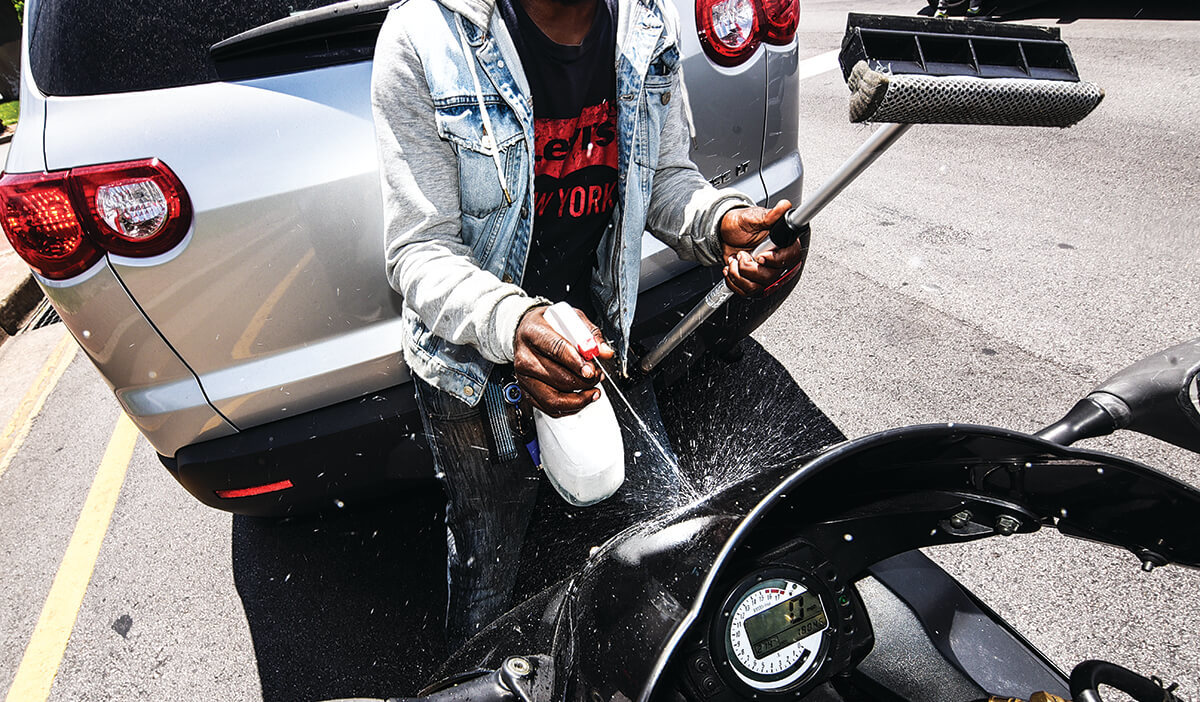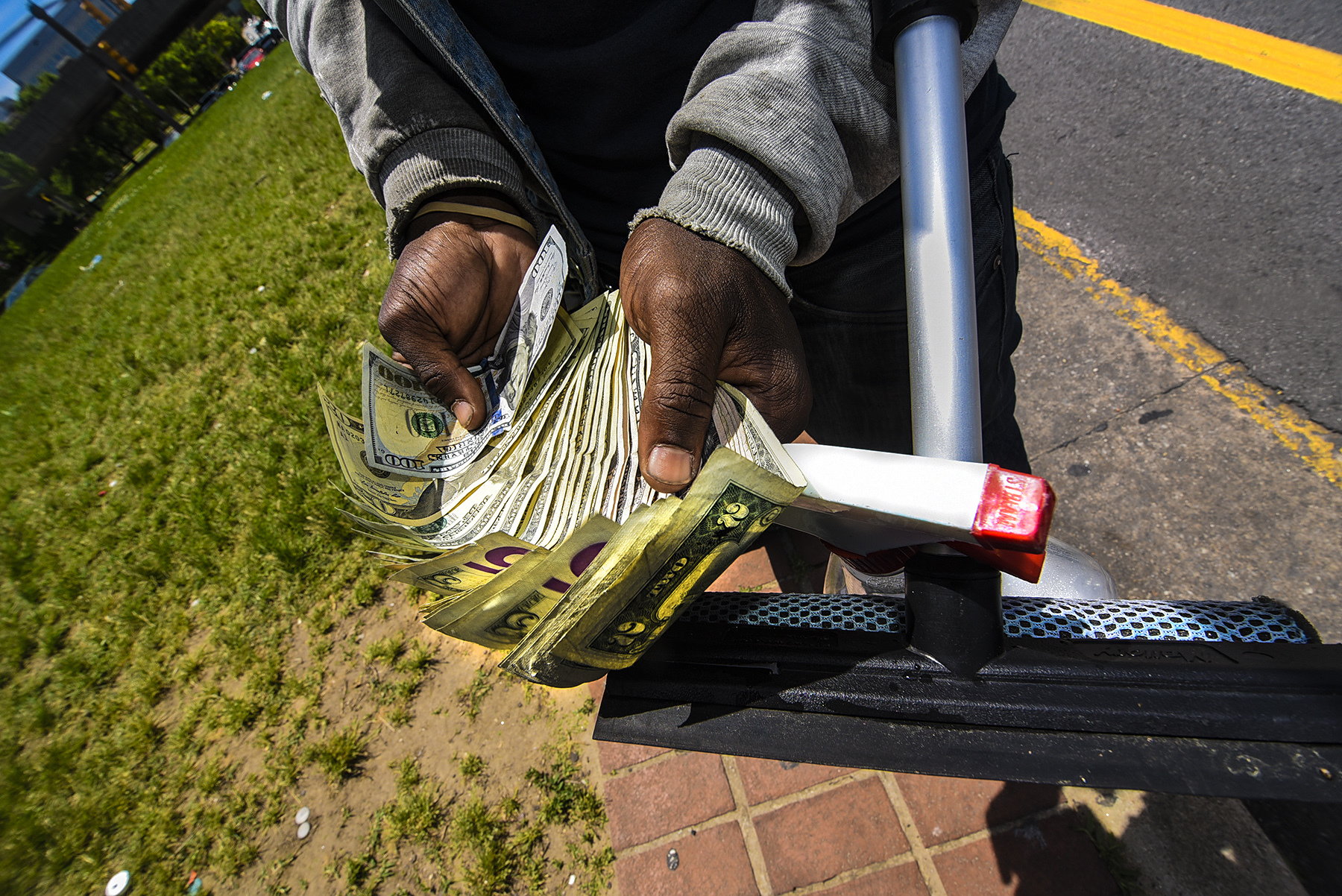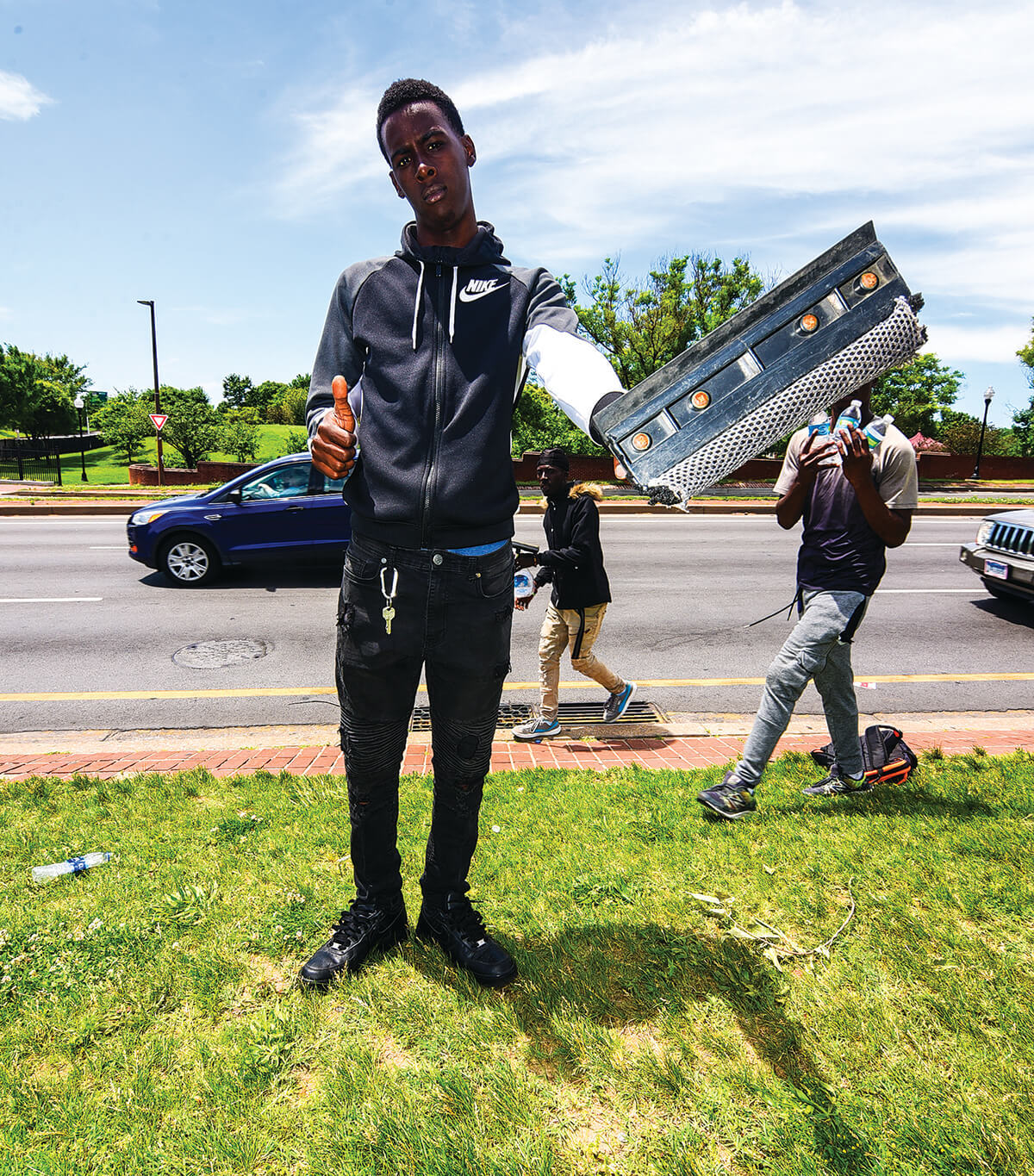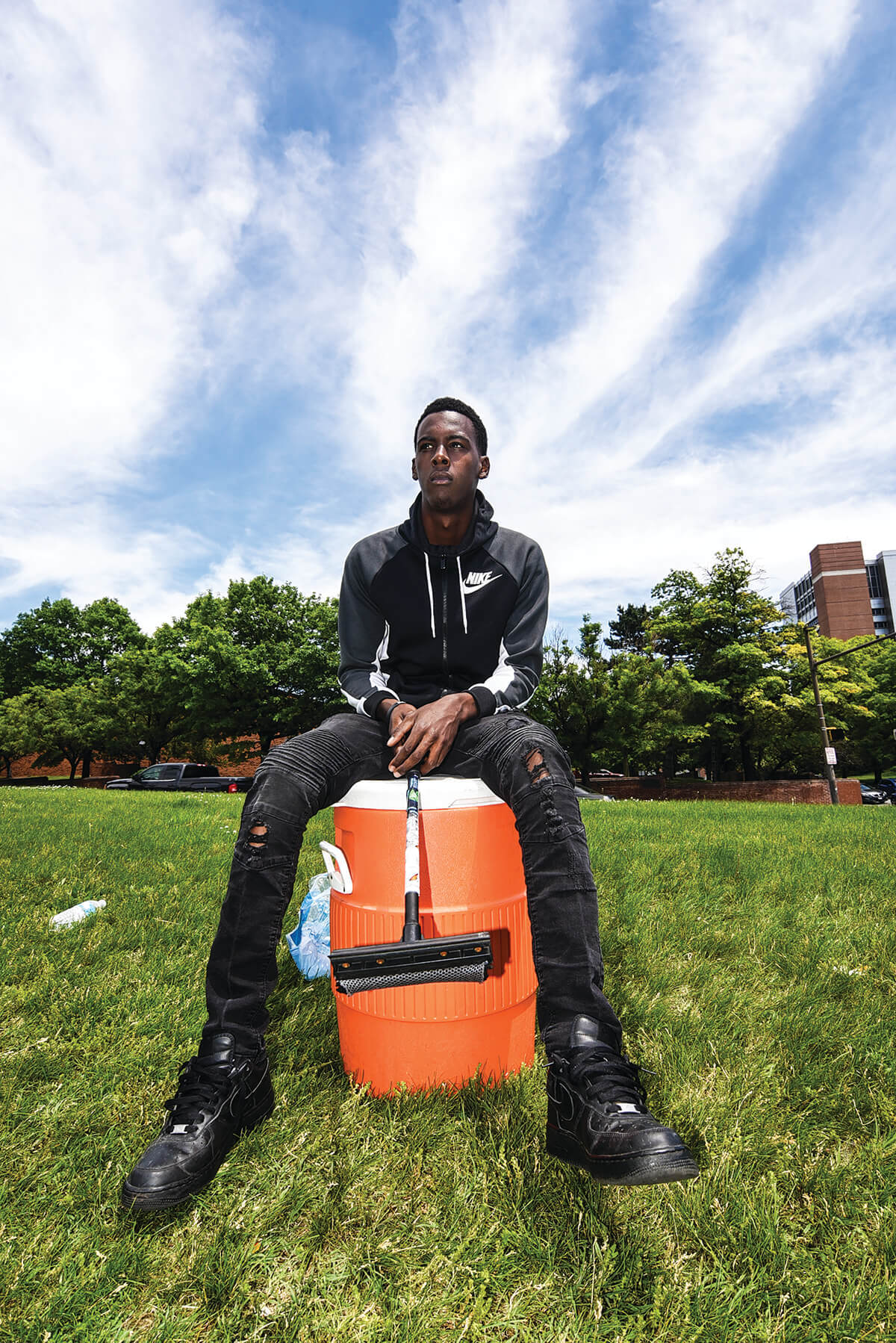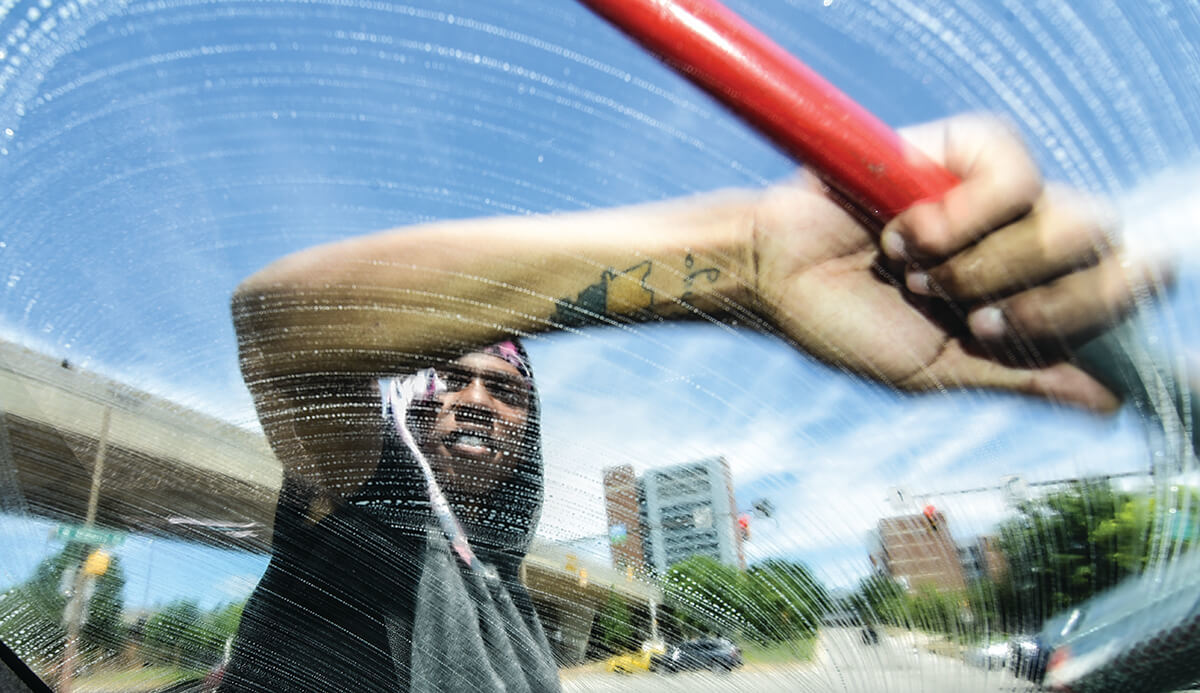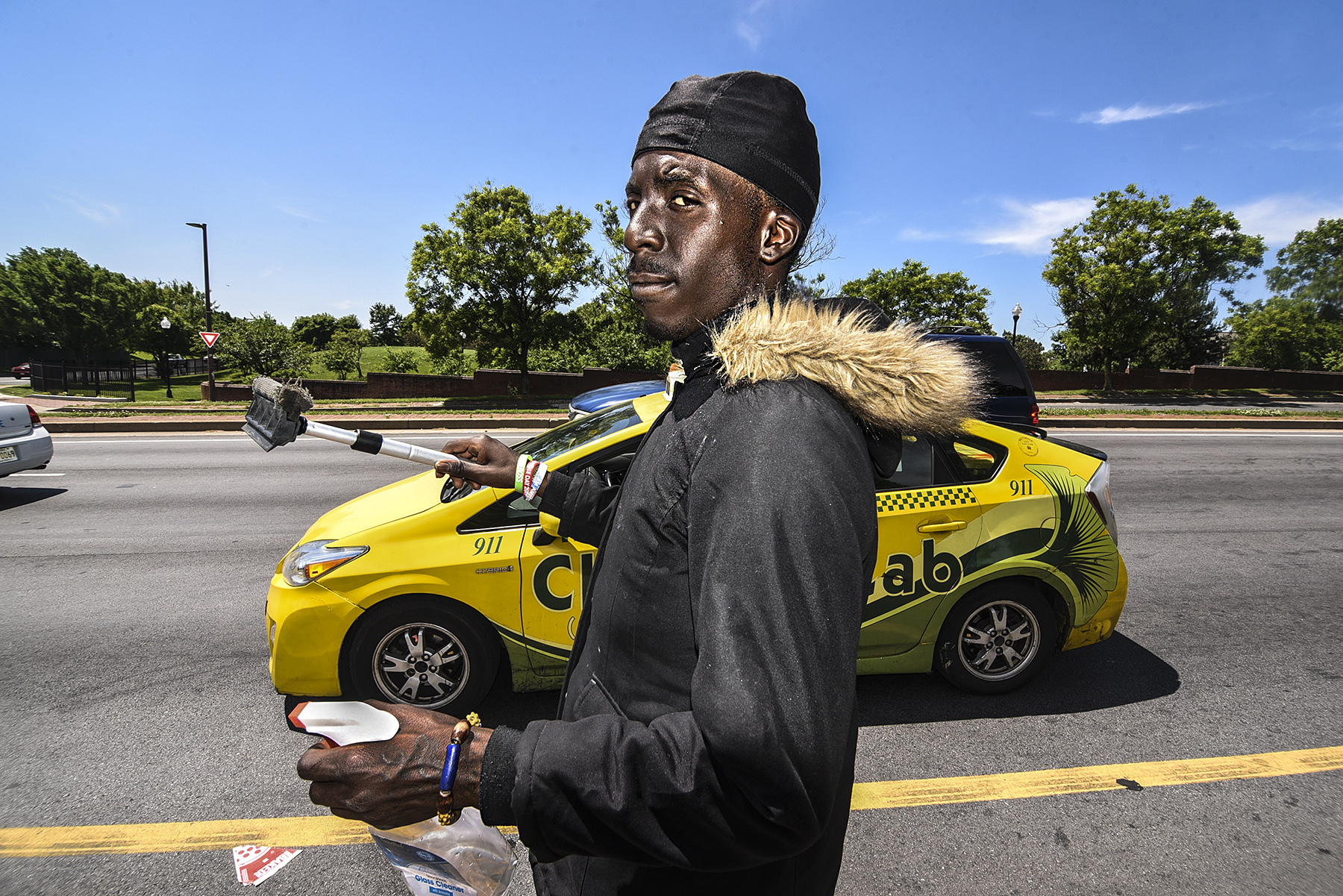News & Community
Coming Clean
Baltimore’s “squeegee kids” have been a source of hot debate and off-and-on concern for decades.
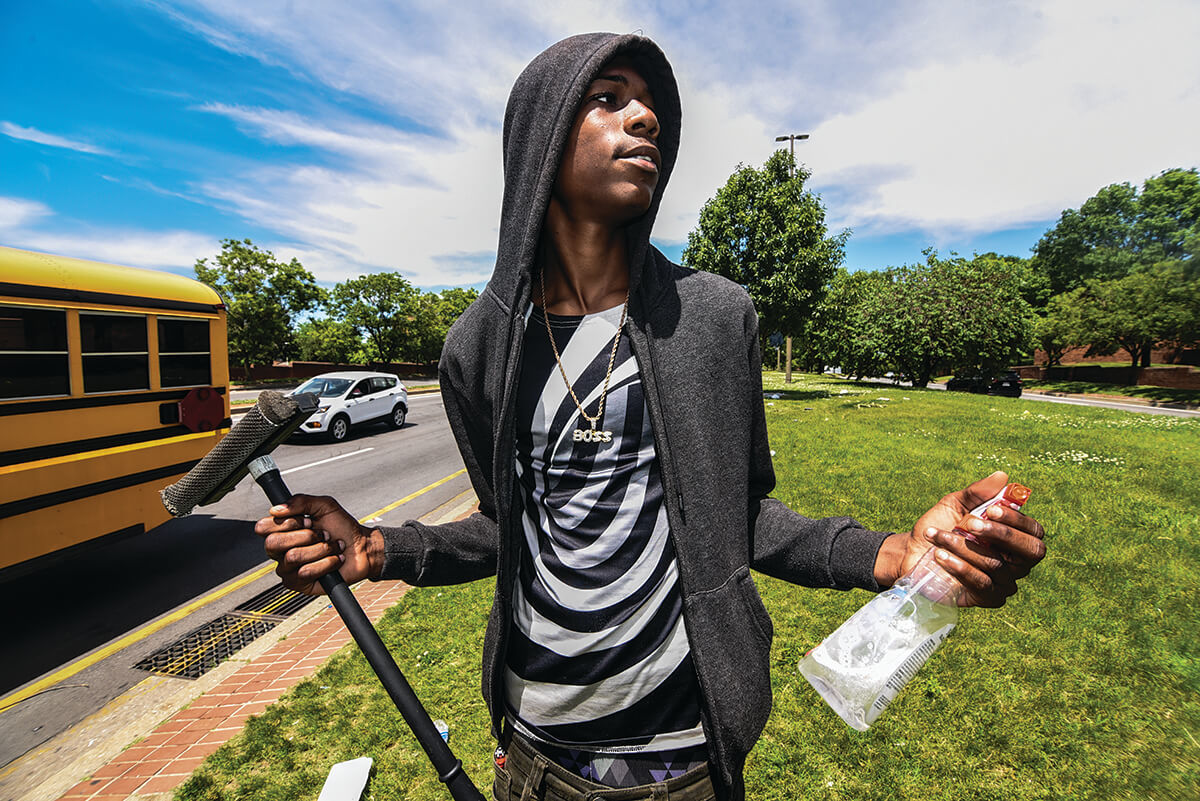
The light turns red at President and Pratt streets in Harbor East and a half dozen teenagers in T-shirts, jeans, and unlaced high tops spring from the grassy median, holding up Windex spray bottles in one hand and gas station-style squeegees in the other. Two skinny younger boys jump into the street first. A couple of older kids shout and laugh at each other over the idling traffic. It’s a clear, bright Sunday in May. The school year is almost over.
They try to make eye contact through rolled up windows.
“I got you,” says one of the teenagers, leaning over the hood of a Honda, spraying a dab on the windshield.
“How are you?” a kid says to another driver. “What’s up?”
“I got you.”
A second teenager sprays a shot of soapy water on a windshield, trying to drum up business. The woman behind the wheel simply continues to stare at her phone.
To still another driver: “You look good, bro. You look sharp. You wanna wash?”
A 40ish white man in a Range Rover frantically waves his arms. “No, no, no! Don’t touch my car.”
A young woman in a Honda Accord smiles as she shakes her head toward James, the self-possessed 16-year-old high school student who serves as this group’s informal crew chief. “I don’t have any money,” she says. But then she offers him her French fries, which he accepts. Before the light changes, four drivers get quick windshield wipes. They appear happy, at least content, to hand over a buck or two for a slightly better view of the world. An equal number of drivers appear annoyed. The rest look relieved they avoided the kids’ face-to-face pitch.
It’s such a familiar scene by now in Baltimore, the two-minute productions play out like a choreographed dance. “The overall reaction? I’d say 50-50,” James says as he steps back to the median as cars begin rolling again. “Some people definitely resent you. Hey, I get it. You’re walkin’ up on their car. Other people tell you they’re glad you’re out here making an honest dollar.
“Most of the time,” James continues, “it’s not even about us. Everybody’s bringing their own stuff they got going on and it gets directed at you.”
Baltimore’s “squeegee kids” have been a source of hot, racialized debate, law enforcement confusion, and political puzzlement for decades. In 1985, the City Council voted 11-7, splitting along white-black lines, to ban the practice and call for arrests. Black council members saw the proposal as racist because the young entrepreneurs the legislation targeted were almost exclusively black. Congressman Parren Mitchell, the first African-American to represent Maryland, decried the hysteria around the squeegee kids in his regular column in The Afro. So did former Sun columnist Roger Simon, generating a maelstrom of letters to the editor.
Then-police chief Bishop L. Robinson, the City’s first black police commissioner, sought the ban because some drivers had complained they felt threatened by the youth and because he was concerned about the squeegee kids’ safety. (Indeed, a 14-year-old was killed the next year by a tractor-trailer.) Facing backlash, Mayor William Donald Schaefer sought time to study the issue. Ultimately, the law went into effect with a compromise—the removal of the threat of incarceration—and stands to this day. None of this flap and fury makes sense to Derrick, who is two years younger than James and has been working a squeegee alongside him since they were 10 and 12, respectively. He says after all this time he still can’t get his head around the daily gamut of responses he receives, and endures, from adult drivers.
“Honestly? It’s confusing,” the 14-year-old says. “Someone will give you a $10 bill and thank you, and the very next person will cuss at you.” Derrick and James, like most of the teenagers hustling at this end of I-83—built, of course, in the 1960s to ferry suburbanites in and out of the city—live in the Douglass Homes housing project near The Johns Hopkins Hospital. “How do you make sense of that when you didn’t do one thing different?”
“What do you want us to do for money?” James says. “Cut grass? That’s a white people thing. There ain’t no grass around here.
Ever since the battle lines were drawn in the ’80s, the squeegee controversy has risen and fallen every few years, typically driven by outrage from white commuters following a fresh report that someone near a squeegee location grabbed a wallet off a car seat, kicked a door, or hurled a water bottle at a vehicle. Each episode inevitably casts everyone with a squeegee in hand in the same dark light. (When a husband who killed his wife falsely claimed last year that a panhandler had stabbed her to death at an East Baltimore intersection, the initial blowback wasn’t only felt by panhandlers, but squeegee youth, too. None other than Oprah said she’d think twice before ever rolling down her window again.)
In 2017, after renewed complaints—BPD fields multiple calls daily that report squeegee workers soliciting in traffic—former Mayor Catherine Pugh launched a “Squeegee Corps” initiative. Her office, estimating there were about 100 squeegee kids they could help get off the street, put together car washes outside City Hall and elsewhere. However, a sustainable program was never put in place.
Last fall, the cycle started again. A driver in Federal Hill accused a black male (whom he later admitted was older and not part of the regular squeegee group with which he was familiar) of shattering the rear window of his SUV, posting a video of the encounter to a South Baltimore Community Facebook page, which went viral. A week later, Downtown Partnership announced plans to place unarmed security guards at intersections to “monitor” the actions of the squeegee kids at a cost of $3,000 per week.
“What do you want us to do for money? Cut grass?”
Two weeks later, a 10-year-old squeegee kid was nearly killed in a terrifying crash—also caught on video—after being struck by a car at President and Pratt streets.
Shortly afterward, Pugh vowed to create a $2-million annual effort, with at least some of the money coming from private sources, to “address the squeegee problem” and develop the next iteration of the Squeegee Corps to move the kids off the street corners. Following Pugh’s resignation, that plan is now up in the air.
“Look, I’m probably more liberal in my views than most of my counterparts,” says Major Richard Gibson. “To me, this is a social problem. It’s similar to the panhandlers, sex workers, and homeless. People complain, it’s illegal solicitation like panhandling, so we deal with it. You get them to move off the intersection. But these aren’t really law enforcement issues unless they do something that’s legitimately criminal.”
A former high-ranking police official, who did not want his name used because of his current job, was more adamant about getting the squeegee kids off the street, similarly lumping them with panhandlers, sex workers, drug dealers, the dirt bike-riding 12 0’Clock Boys, and the homeless—as well as the large groups of youth who from time to time have stirred tensions with the police at the Inner Harbor. “They are a part of what people see as the chaos of Baltimore when they drive into the city,” he says.
The squeegee kids don’t see themselves that way at all.
“Everybody got a reason to be out here, or they wouldn’t be here,” James says later in the afternoon. “Not everybody has two parents at home or people looking after them the way they should.”
Derrick uses some of the money he earns—$100-$150 after six to seven hours on a busy weekend—to help his mother pay rent. “I’ve got four siblings,” he says. “I come out before school some mornings to have money in my pocket and get something to eat after. Who else is going to help us?”
Donovan, 19, wearing a Ravens cap, is among the oldest here—most are between 10 and 18—and knows firsthand the other alternatives to making money for black males growing up in poverty in Baltimore. He got caught selling drugs when he was younger. “I’ve seen friends die and go to jail with long sentences,” he says. “I’ve seen some pretty terrible stuff, and I don’t want that.” He picked up a squeegee a year ago, even though police do charge squeegee workers with aggressive panhandling and illegal solicitation from time to time because “I’m my only source of income,” he says. Young guys like Derrick and James are actually positive role models to the boys in their neighborhood, Donovan adds, because they aren’t selling drugs and have their own money to buy shoes and clothes, as well as the occasional soda for an 8- or 10-year-old. That said, Donovan adds, they get profiled regularly in public places.
“If we go to eat at a restaurant after being out all day, what we get is, ‘No, no, no. Too many of you,’” he says. “And we got money. That doesn’t happen if you’re white. Same when it comes to using the bathroom. Can’t use the bathroom even when we are buying something. Same at the mall, security following you around. Secret shoppers, following you around. You’ve got have your money out when you’re in a store or you get chased out.”
Personable and thoughtful, Donovan says he plans to go back to school and would like to learn how to buy and invest in real estate. James, who’s adding a job washing dishes, wants to own a car wash after he graduates and employ some of his cohorts.
“Instead of them experiencing unfair treatment for bringing income into their homes, they would benefit from more outreach support—school and career counseling and other services, ” says India Bell, a Baltimore social worker and former resident advisor with the Department of Juvenile Services who regularly engages the young men along Martin Luther King Boulevard near Route 40. “Things have fallen apart in this city, in this country. We have long incarcerated black males at disproportionate rates, and that has impacted the families and neighborhoods where these kids are from. As well as segregation, redlining, and disinvestment. I know—I’m from one of those neighborhoods.
“The bottom line,” Bell adds, “is that kids shouldn’t have to spend their childhoods out in the street earning money.”
Baltimore author D. Watkins, editor at large for Salon, went from dealing drugs to a career as a teacher and writer. He spends a lot of time in local schools and knows some of the same squeegee workers that Bell does along MLK Boulevard, including a former high-school student he taught at the Friendship Academy. Watkins also made a few dollars as a squeegee kid in the late ’80s and early ’90s. “A lot of people don’t understand the perspective of these kids,” Watkins says. “They are scared to interact with them and a lot of people get frustrated with them. Everybody is scared of everybody and nobody is talking to each other. Meanwhile, the former mayor initiated the Squeegee Corps, and that went away and she kind of abandoned them.”
“People sell drugs on the corner every day. I got no interest. Not for me.”
Kaye Whitehead, who teaches at Loyola University and hosts a WEAA talk show, echoes Bell and Watkins. “If this was a lacrosse team in the street raising money with buckets for a trip to play in a tournament, no one would have an issue,” she says. “We as a city need to lean in and find ways to support them. The folks who were doing this 40 years ago have grown up, but this generation is running up against the same problems.”
Bell stresses that no one believes it’s a good idea for children and teenagers to be bouncing through traffic at stop lights. But in a sense, she says, the squeegee corners are “safe spaces” for many kids. “They have a measure of independence, they can act like 15, 16, 17-year-olds. In their neighborhoods, there’s always a lot of trauma and stress, and they feel like they have to keep their guard up and watch their back.” In fact, one 14-year-old squeegee kid mentioned the threat of getting robbed by older teens and young men walking back to his own neighborhood in the evening with squeegee money in pocket.
Local business owner Chris Wilson, who did 16 years in prison for a crime committed while a juvenile, sees himself in the young men wielding squeegees. “I tell every single one of them I respect the hustle and I respect them trying to make a living,” says Wilson, author of The Master Plan: My Journey from Life in Prison to a Life of Purpose. “They’re doing all the things an entrepreneur does. They’re calculating how much cleaning supplies to buy, how much water to buy if they’re selling bottles of water, what’s the best time to work, the best location, how much they need to make. The next step is setting longer-term goals. Nobody teaches them how to set goals, make a plan, and then walk down that road.”
To Wilson’s point, some of the kids, concerned about public relations, have begun leaving soapy hearts on women’s windshields.
Nate, a lanky, charismatic 19-year-old who lives in the McCulloh Homes housing project in West Baltimore, says he had a job at Walmart at the Golden Ring Shopping Center, but the bus rides and taxes left him with little time and money to show for his effort. He started squeegeeing two-and-a-half years ago, trying to do both for a period, along with his friends Carlose, 22, Antoine, 17, and Derwood, 20, who was also hawking bottles of cold water for $1 on a recent Monday afternoon. He readily acknowledges quitting school in 10th grade was a mistake and wants to earn his GED. “You need school, and you need that degree,” says Nate. “When I quit, I couldn’t even have told you why I quit other than I was bored. But I realize I wasn’t getting what I needed from school, either.”
“I’d like to own my own business,” he continues. “Maybe start a small clothing line or open a food truck. Even a car wash down at the Rite-Aid parking lot,” he says, gesturing down the street, “would be a start and better than minimum wage. People sell drugs on the corner every day in Baltimore, and I got no interest. Helicopter surveillance, drama, and violence. Not for me. I don’t like it. We’re in entirely different lanes.”
